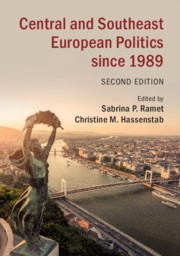‘The second edition of this useful collection of essays provides context for the persistent challenges to what in 1989 was advertised as the ‘transition' of Central and Eastern Europe from Communism to liberal democracy and European integration. Contributors take a sober view of populism and the stubborn corrosive of corruption and provide specific suggestions on how governments, activists, and European institutions might overcome the disorientation that has afflicted them since at least the financial crisis of 2008. It helps the reader understand that ‘progress' is only one of multiple plausible futures for the region.'
David Kanin - The Johns Hopkins University
‘This second edition of the Ramet-Hassenstab book is an extraordinary and timely contribution to rethink the long itinerary of post-socialist Europe from the ‘Great Transformation' of 1989 to the current events. Shedding new light to the impact of reforms and societal transformations, this highly recommended book offers an updated and unique analysis of a world under deep transformation, where still corruption, freedom constraints of media, reforms stagnation, and attractive ‘illiberal democracy' perspectives are playing a crucial role within a broader, European context, which is increasingly under growing disorder.
Stefano Bianchini - University of Bologna, Forlì
‘With the European Union finally taking note of the illiberal trends in some newer members, this updated volume is a timely look at the mixed outcomes from the post-Communist transitions. Bringing together the insights and analyses of noted specialists from North America and Europe, Ramet and Hassenstab have again grappled superbly with understanding the challenges to democratic resilience, economic reform, and regional security in an era of rising populism, Russian resurgence, and fragile institutions.'
Robert F. Goeckel - State University of New York, Geneseo
‘This book shall be of use and importance to students, analysts and policymakers interested in any country of the region, and in the different experiences of these neighboring countries.’
Senada Zatagić
Source: Insight Turkey
'Where this textbook really shines and comes into its own is in the level and depth of analysis undertaken by each author, something that is often not seen in a textbook of this nature. This one serves as an excellent introductory text for students taking their first steps into the history and politics of the region and will probably find itself on many recommended reading lists. At the same time, the book also serves as a useful reference for more knowledgeable readers who want to reacquaint themselves with the region before delving deeper into the literature. All readers will benefit from the strong empirical account of the region’s development accompanied by expert analysis at the theoretical level.’
Jonathan Millins
Source: Europe-Asia Studies



